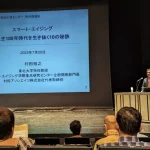
Population.sg 8月14日
 シンガポール政府のNational Population and Talent Division (NPTD)が主催する「Population Singapore」というサイトに「Smart ageing strategies in Japan, Taiwan and Singapore」という記事が掲載され、私がスマート・エイジングの提唱者として紹介されています。(写真はシンガポール首相官邸)
シンガポール政府のNational Population and Talent Division (NPTD)が主催する「Population Singapore」というサイトに「Smart ageing strategies in Japan, Taiwan and Singapore」という記事が掲載され、私がスマート・エイジングの提唱者として紹介されています。(写真はシンガポール首相官邸)
記事の内容は今年5月にシンガポールで開催されたAgeing Asia Innovation Forumでの講演の内容を基にしているようです。日本で大成功した女性専用フィットネス「カーブス」の話も引用され、日本では民間企業がビジネスをけん引する形で社会のスマート・エイジングを推進しており、民間企業の活動がソーシャルキャピタルになっているという内容になっています。以下に全文を転載します。
Japan: A new way to grow old
Japan is at the forefront of super-aged societies, with almost 28 per cent of the population older than 65 years. But instead of having a bleak outlook of its declining population, the Japanese are relooking the entire process of managing ageing related issues.
As more citizens are expected to live till 100 and beyond, the government launched a council for designing a society for 100-year life in September last year (2017). It aims to formulate policies that are more senior-centric, such as helping older folk work longer, contribute to society with their rich experiences or refresh their lifestyle.
“Being 70 years old today is like reaching one’s 60s or 50s in the past,” said Japanese Prime Minister Shinzo Abe at the council’s first meeting. “I myself will turn 63 this year, but I still feel like I am 52 or 53.”
To feel young again, Japanese society also has to reconcile with previous deep-seated negativity associated with ageing.
Just over a decade ago, it was taboo to talk about death before you die, noted Dr Hiroyuki Murata, a professor from Tohoku University’s Smart Ageing International Research Centre.
Today, Japan’s society has undergone a paradigm shift. “We believe ageing is gain, ageing is developing, and we strongly believe ageing is human growth,” said Dr Murata at the 9th Ageing Asia Innovation Forum (AAIF) held in Singapore this year.
He proposed a ‘smart ageing’ strategy to help seniors age actively. One initiative he brought to the Japanese market is Curves, a women’s fitness franchise that offers 30-minute workout sessions. Starting in 2005, there are now over 1,800 studios in Japan with 840,000 female members. Their average age is 63.
The driving force behind societal change is the private sector, added Dr Murata. It helps that big retailers and supermarkets are now targeting seniors, offering perks from early bird discounts to morning activities such as radio gymnastic classes.
“To give senior customers the economic incentive to go out and make new friends – those are the kinds of social capital activities that more should do,” he noted.
出所:Population.sg







